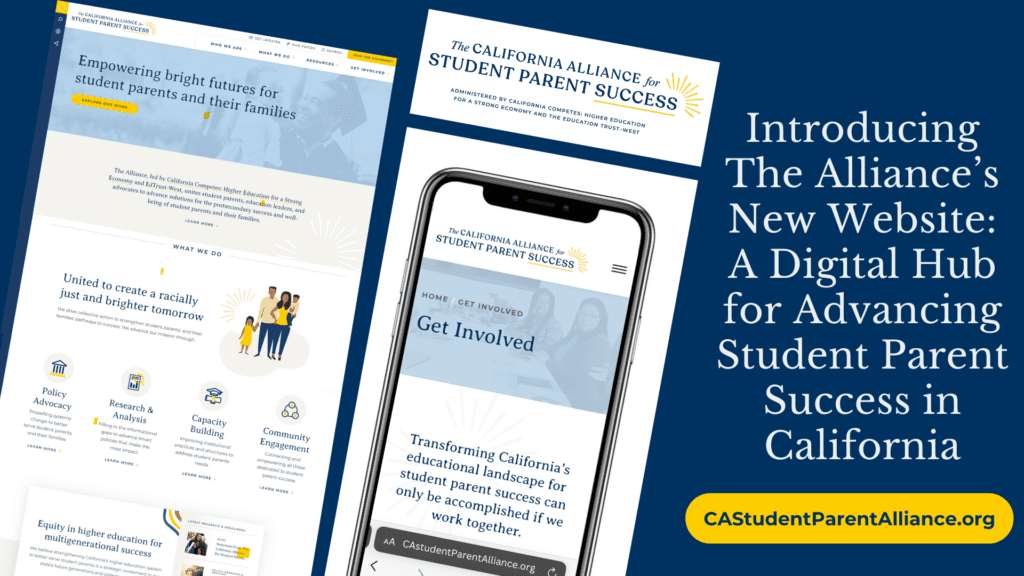California Competes hosted its annual California Higher Education Policy Institute for Legislative Staff on Friday, March 11, 2022. This two-hour event aimed to educate and engage legislative staff on key higher education issues that are crucial to informing state policymaking.
AGENDA & BACKGROUND MATERIALS
Agenda
I. Welcome and Introductions
II. California’s Student Parents
As California’s public higher education system shifts to better address the needs of today’s college students, who are often juggling work and academic obligations, the segments must not overlook the growing number of student parents—which include pregnant students, students on parental leave, and others with dependent care responsibilities. These hundreds of thousands of students with dependent children have greater financial need than their non-parenting peers and are less likely to persist from year to year or earn a degree or certificate. Additionally, the majority of student parents intend to enroll in a community college, rather than a public four-year or private university, and steps need to be taken to ensure they achieve their educational goals. Prioritizing their needs and carving a pathway to and through higher education, specifically community colleges, would not only benefit the parents, but improves their child’s success and strengthens California’s economy, creating more vibrant communities.
This session will cover four strategies for better supporting student parents:
-
Increasing the availability of affordable and quality dependent care
-
Increasing higher education affordability for student parents
-
Advancing student-parent friendly institutional design
-
Collecting and sharing data on student parents
ACCOMPANYING MATERIALS
III. Interactive Postsecondary to Prosperity Data Dashboard Session
Our state’s strength lies in the diversity of its people, communities, and regions. The California Postsecondary to Prosperity Dashboard braids together multiple data sources to provide a single portal with high-quality information on the state of opportunity in higher education, employment, and quality of life across California’s diverse regions. This Dashboard highlights the state’s successes and also broken opportunities in the pathways from education to prosperity. In this interactive session, legislative staff will explore the Dashboard to learn how the lives of Californians differ dramatically based on their race, ethnicity, gender, income, place of residence, and more, including in their own regions.
ACCOMPANYING MATERIALS
- Explore the California Postsecondary to Prosperity Dashboard
- Postsecondary to Prosperity: Examining California’s Opportunity Landscape
IV. Higher Ed and the Workforce: Bold Ideas
California leaders must drive an inclusive economic recovery and future resiliency by strengthening the state’s education-to-employment pipeline. Our higher education system must meet the needs of the California economy far better than it currently does—and students need to know their education will lead them to stable, well-paying jobs. When higher education and workforce are in alignment, better-trained workers get higher-paying jobs, employers get more qualified candidates, and our state builds a strong, inclusive, and sustainable economy fueled by a skilled, diverse workforce.
In this session, we’ll share bold ideas for connecting higher education and the workforce. We will also share preliminary research findings that illuminate the challenges that colleges and employers face in fostering relationships that create pipelines to living wage jobs for students.
ACCOMPANYING MATERIALS
- Bold Proposals to Strengthen Higher Education and Workforce Alignment
- Meeting California’s Demand for Allied Health Workers and recording of the subsequent webinar, Critical Care: Increasing the Capacity of Allied Health Care Workers
V. The Impact of AB705 on Adult Learners
Completing both college-level mathematics and English is a major obstacle faced by many community college students across the nation en route to completing degrees and transferring to four-year colleges. Until recently, a CCC student who scored below a minimum cutoff value on a placement test in either subject usually would have been forced to expend precious time, effort, money, and perhaps financial aid taking developmental education courses that do not count towards degrees. Some students had to take sequences of up to four developmental courses over multiple terms prior to enrolling in college-level math and English, and many responded by dropping out or switching to less academically demanding (and ultimately less remunerative, on average) programs or institutions. Over the last 20 years, individual campuses and districts have adopted a number of programs intended to “accelerate” students through developmental education and college-level coursework. In 2017, the state adopted AB 705, which requires colleges to use multiple measures for math and English placement and to “maximize the probability that a student will enter and complete transfer-level coursework in English and mathematics” in one year, sometimes in tandem with corequisite support courses.
In this session, we’ll provide a sneak peak of research findings on the impact of developmental education reforms on students 25 and older, who make up 70 percent of community college students. We’ll spotlight campuses that have narrowed the gap between adult students and younger students and where adult students perform better than expected in college-level math and English courses.
ACCOMPANYING MATERIALS
- Get Ready: Introducing the Millions of Adults Planning to Enroll in College
- Untapped Opportunity: Understanding and Advancing Prospects for Californians Without a College Degree
VI. Wrap-Up
INSTITUTE PRESENTERS
Meet our Staff Institute Presenters:

As Executive Director, Dr. Su Jin Gatlin Jez leads California Competes’s work to develop nonpartisan and financially pragmatic recommendations for improved higher education and workforce policies and practices across California.

As Senior Researcher, David Radwin helps develop the research agenda for California Competes and leads research projects that shape and inform the organization’s policy priorities.

As Senior Policy and Research Analyst, Alejandra Acosta analyzes state, regional, local, and intergovernmental higher education and workforce policies and conducts research on issues aligned with the organization’s policy priorities.


